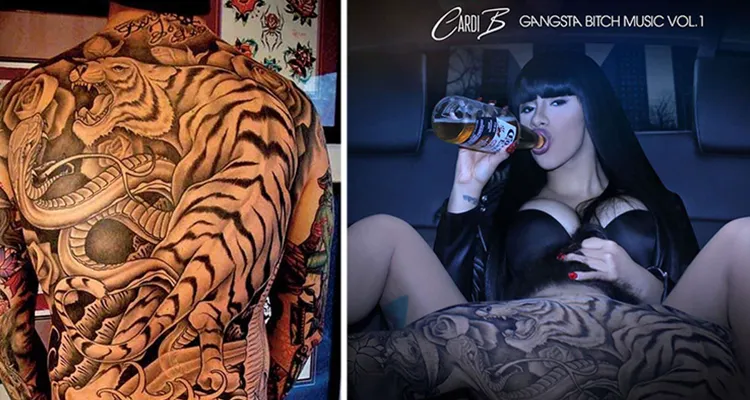Photo Credit: Court Documents
A federal judge has officially refused to reconsider the jury’s verdict in the much-publicized “back tattoo” lawsuit filed against Cardi B.
Judge Cormac J. Carney today denied plaintiff Kevin Brophy Jr.’s Rule 50 motion for judgement as a matter of law. Having levied the original complaint way back in 2017, Brophy Jr. had in this latest motion aimed to overturn the aforesaid not-guilty verdict that a jury returned after a four-day trial in October of 2022.
For background, Brophy Jr. alleged in his action that the photo on the cover of Cardi B’s Gangsta Bitch Music, Vol. I, featuring a shirtless male in a compromising position with the rapper, had (among other things) embarrassed him and damaged his reputation.
And that’s because Brophy Jr.’s own back tattoo (pictured above) allegedly resembles that of the model, The6atSix, who posed with Cardi B for the image. This model’s tattoo is rather prominently shown on the cover of the New York City-born artist’s debut mixtape, and Brophy Jr. claimed that he often removes his shirt while performing work-related duties at his surf-marketing job.
Predictably, Cardi B and her legal team unsuccessfully pushed to dismiss the suit, and the one-time Grammy winner (and nine-time nominee) was deposed in 2019.
Now, as initially mentioned, Judge Carney has formally denied Brophy Jr.’s motion for judgement as a matter of law.
In explaining the decision across 12 detail-oriented pages, the presiding judge indicated off the bat that Brophy Jr. had “indeed waived his right” to submit “a Rule 50 motion by not doing so by the close of the evidence or stipulating to making such motions at a later time.”
“Brophy does not claim that he in fact made a Rule 50(a) motion before the case was submitted to the jury,” the text elaborates. “Rather, he points to instances when the parties and the Court discussed the best process for making such a motion and argues that the instances either amounted to a stipulation allowing each party to make a motion after the verdict or otherwise preserved a party’s right to make one then. But that is not the case.”
And after driving home that “Brophy’s untimeliness amounts to a waiver,” Judge Carney communicated in the filing’s latter half that “the motion also wants for substantive merit.”
“Brophy seeks judgment as a matter of law despite the jury having heard competing evidence on a variety of issues[,] the determination against Brophy on any one of which would justify the jury’s verdict,” the appropriate section of the order reads. “This, a court cannot—and the Court will not—grant.”
The jury had “ample basis for its verdict,” the document proceeds, including that “the model’s tattoo was not sufficiently identifiable with Brophy” for several reasons. Lastly, the jury could have likewise determined “that Brophy suffered no harm” from the cover image and/or “that any use of Brophy’s likeness in the mixtape cover was transformative.”
“In short, reasons abound to sustain the jury’s verdict of not liable on all claims,” the filing concludes. “It is not for this Court to second-guess the verdict now.”
Although the controversial “back tattoo” complaint is finally in the rearview, Cardi B is now facing a potential suit centering on the Marge Simpson costume that she donned for Halloween.

